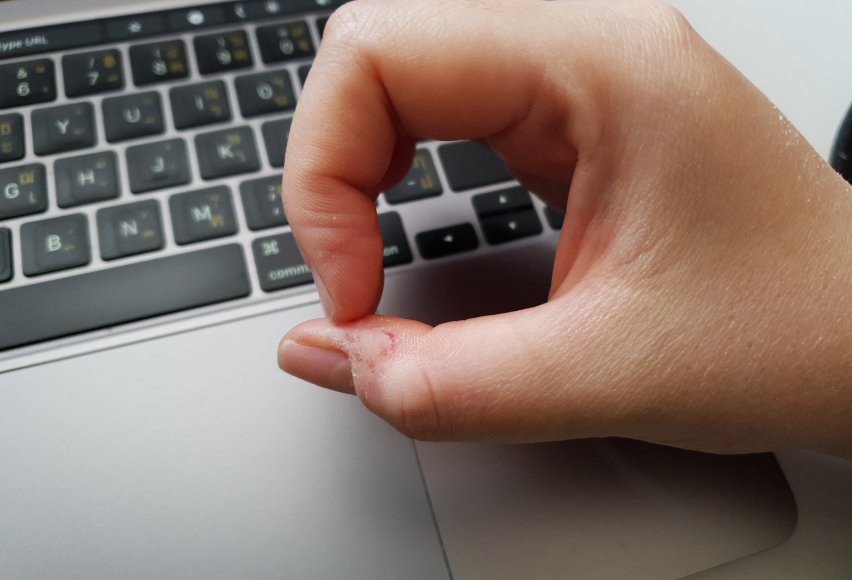Making Sense of Skin Picking: Understanding the Functional Purpose Behind Excoriation Disorder

Online test
Find out the severity of your symptoms with this free online test
If you’re living with skin picking disorder, clinically known as excoriation disorder, the picking can sometimes seem random, irrational and unpredictable. Maybe you’ve even wondered, “Why do I do this?” “What’s wrong with me?”
Let’s be clear. There is nothing “wrong” with you.
Skin picking is something of a paradox. On one hand, it is a clinically recognized mental health disorder. It is characterized by repetitive skin picking that results in visible skin damage. It also creates significant emotional distress and often carries a heavy burden of shame.
On the other hand, it’s not irrational or random behavior. Skin picking serves a purpose. Wait…what?
The Role of the Brain
The brain is hardwired to seek relief from distress be it physical, emotional, or psychological. When stress or anxiety spikes, the body’s nervous system activates, signaling a need to self-regulate.
Think of it like this: When you’re on emotional overload, your brain searches for ways to self-soothe, to alleviate the distress. For some people, that might look like journaling, meditating, or zoning out in front of a screen. For others, it might be twirling their hair or scratching, rubbing, or even picking at their skin. Why? Because it momentarily brings a sense of relief, or even satisfaction.
In this context, skin picking makes a certain kind of sense. It becomes a coping strategy. Is it the healthiest coping strategy? No. But it’s not random either. It’s learned over time (even if you’re not aware of it), and it is functional. It is helping you manage something that feels unmanageable. Skin picking is about the skin and more about soothing an overly stressed system.
The functional purpose of skin picking is also thought to tie into emotional regulation. Stressful situations, unresolved trauma, or even everyday frustrations can create a sense of internal chaos. It is thought that picking offers a way to externalize that chaos, to focus the mind on something tangible, like a blemish or a rough patch of skin. For some people, picking is a way to distract from overwhelming emotions. For others, picking is an attempt to gain control when life feels chaotic or unpredictable.
The Cycle of Shame
One of the most painful parts of living with skin picking is the shame that it often brings. Many people describe picking episodes where they lose track of time, only realizing the extent of their picking after the fact. This trance-like state is linked to the brain’s reward system. When you pick, the brain may interpret the act as a solution to distress, reinforcing the behavior over time. This creates a cycle: stress triggers picking, picking provides temporary relief, and the brain learns to repeat the process. People with skin picking disorder often describe feelings of shame and guilt about their skin picking and inability to stop.
This shame can be so strong that it keeps people from seeking support or talking openly about their experience. Many hide their skin, make excuses, or avoid situations where their picking might be noticed. But shame only reinforces the cycle. When we feel ashamed, we become more stressed. When we’re more stressed, we’re more likely to pick. It becomes a vicious, hard to break cycle.
Recognizing the function of skin picking is the antidote to shame. When you see that your skin picking is a coping mechanism, and not a reflection of weakness or lack of discipline, it paves the way for approaching your skin picking with compassion and without judgment. You're not broken. You’re trying to cope the best way your brain knows how.
What You Can Do
Serving a purpose doesn’t mean that skin picking isn’t a challenge or that it doesn’t cause harm. It can and often does. It also doesn’t mean that you have to stay stuck in that cycle. Understanding your skin picking is the catalyst for change.
When you understand that your skin picking is your brain’s attempt to cope, finding healthier, sustainable coping strategies that meet the same need can help open the door to healing. Some strategies might include:
- Practicing mindfulness and grounding techniques to help you stay present during stressful moments.
- Using fidget tools or textured items that give your hands something to do.
- Therapy, especially approaches like Cognitive Behavioral Therapy (CBT) or Habit Reversal Training (HRT), which has been shown to be effective in treating BFRBs like skin picking.
- Practice a healthy skin care routine.
- Build a support system. Connecting with others can remind you that you’re not alone.
Above all, be kind to yourself. You’re doing your best and your brain is too.
The Takeaway
Your skin picking is not a reflection of your worth or strength. It’s a sign that your brain is working hard to manage distress in the way it knows how. You have the freedom to unlearn what no longer serves you and learn new and healthier ways of coping. With time, support, and the right tools, you can find healthier ways to cope while honoring the resilience that’s carried you this far.
Figuring out next steps can be hard. The good news is you don’t have to do it alone. A therapist who specializes in treating skin picking can help you find the strategies and treatment that are just right for you. At Skinpick.com we have a team of experienced therapists ready to help you take the next step towards healing. And online therapy makes getting help comfortable and convenient. When you’re ready, there is help and hope waiting for you.
References
1. McEwen, B. S., & Gianaros, P. J. (2010). Central role of the brain in stress and adaptation: links to socioeconomic status, health, and disease. Annals of the New York Academy of Sciences, 1186, 190–222. https://pmc.ncbi.nlm.nih.gov/articles/PMC2864527/
2. Roberts, S., O'Connor, K., Aardema, F., Bélanger, C., & Courchesne, C. (2016). The role of emotion regulation in body-focused repetitive behaviours. The Cognitive Behaviour Therapist, 9, E7. https://www.cambridge.org/core/journals/the-cognitive-behaviour-therapist/article/abs/role-of-emotion-regulation-in-bodyfocused-repetitive-behaviours/8E267245687F7D75A63ED2B2214482D1
3. Anderson, S., & Clarke, V. (2017). Disgust, shame and the psychosocial impact of skin picking: Evidence from an online support forum. Journal of Health Psychology, 24(13), 1773-1784. https://pubmed.ncbi.nlm.nih.gov/28810443/
4. Understanding skin picking and itching: The emotional causes and how to break the cycle. (2025, April 21). Skin-focused Naturopathy Clinic Based in Melbourne. https://www.husknaturopathy.com.au/journal/understanding-skin-picking-and-itching-the-emotional-causes-and-how-to-break-the-cycle
Online test
Find out the severity of your symptoms with this free online test
Start your journey with SkinPick
Take control of your life and find freedom from skin picking through professional therapy and evidence-based behavioral techniques.
Start Now



